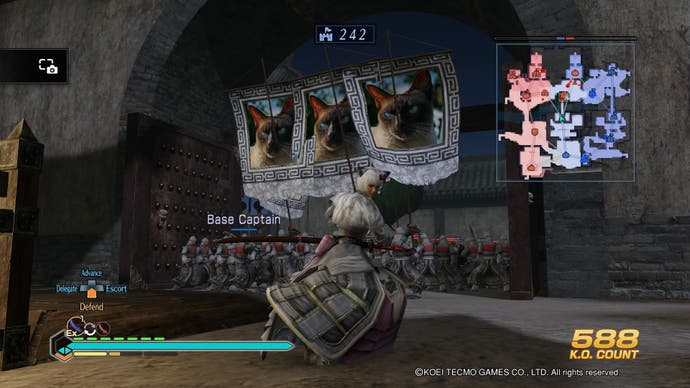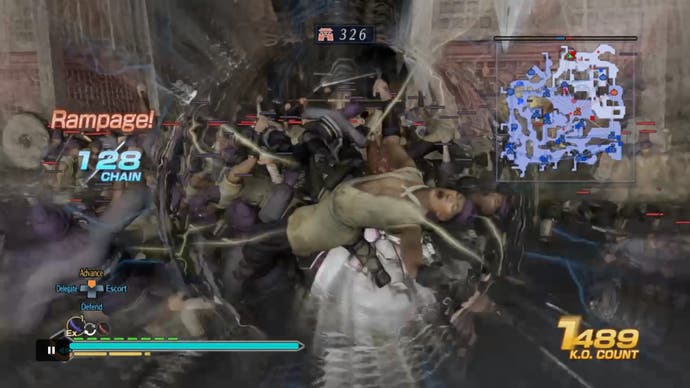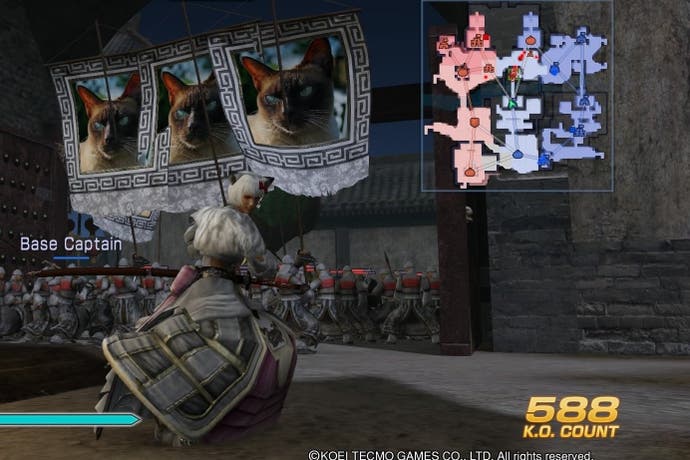Dynasty Warriors 8 Empires review
How my cat ruled China.
It's fair to say that whenever there's a Dynasty Warriors, there'll be an Empires to go with it. This latest instalment follows the usual path; take the combat from the latest Dynasty Warriors and weave strategy all around it. The hack-and-slash carnage is embedded, compartmentalised and re-focused within a superstructure of turn-based expansion and consolidation. For many, it'll be the same old story, but it offers a multitude of joys for diehard fans, especially if they haven't played DW7 Empires. For anyone lured in by DW8, Dynasty Warriors 8 Empires sets a much deeper and detailed challenge.
Barely building on the previous Empires title, DW8's take includes the traditional Koei dash of some new stuff, including marriage and children. You can play it as a loyal servant to one of Dynasty Warriors' famous generals, sticking with them or stabbing them in the back, or work as a free agent for hire and set up shop on your own. Ultimately you're seeking the unification of China, and the most fun to be had is in taking it all by force.
A real highlight is the opportunity to create your own warrior and go fighting in marvellous costumes. I set up a character based on my cat, gave it my favourite Musou warrior Zhou Tai's move-set and quickly formed an alliance with the common first-bloods of the Dynasty Warriors universe - the Yellow Turbans. I happily followed the orders of crazed wizard Zhang Jiao and we expanded our territories with decent pace, but old Zhang Jiao has little love for his people, conferring the rank of DESPOT upon my feline swordswoman. This would not do at all. Nobody makes Monktonia a despot.

Once I'd reached the higher echelons of the Yellow Turban's government, I was able to build shiny new facilities in the territories I controlled, and donate riches to make the people happy. I also had the power to break away from the Yellow Turbans, but I had to pick the right moment. Should I cruise onwards until my personal army and territory are nicely levelled up, or break away before my tyrannical benefactor gets too much control of the land?
This kind of internecine drama plays out in the game's menu-driven Strategy screens, which display a situational map of China. The options can be overwhelming at first, but the structure is easy enough to follow - each action takes a month, and there are a set number of months before the next War Council meeting. Here, objectives for your faction are set, which can lead to a grand battle where a territory is won or lost. So as your faction grows (or not, depending on difficulty level), you have time to do your own thing. There are quickie quests for low-rank characters to pick up weapons and allies, and there are raids to weaken territories near your empire in preparation for takeover. You can also master the logistics of ancient warfare by raising and training troops and managing your generals, or undertake the aforementioned social development initiatives and job creation schemes. You can engage in personal PR, strengthening ties with internal compadres and external allies (or undermine and weaken them). Generals may fall for your incredible battle prowess and confess their love for you. You can marry and have children, who are a blend of their parents. After a few years, they'll even become generals in your army and you can fight alongside them.
Going solo is when the real fun begins. Either by establishing a faction or breaking away from another, Dynasty Warriors 8 Empires throws open its doors and its true depths start to be revealed. Diplomacy and violence can be sole focuses, or they can be blended. But be warned - a rapidly expanding empire will expose a wider area to defend, and you could be repelling more invasions than you can personally conduct. Herein lies the balance to be found. The choice of where, and when, to invade can prompt quite a bit of chin-scratching, especially when there's always the option to sit still and strengthen your forces. Why not just consolidate and concentrate your power while other factions grind themselves into tactical vulnerability? Because one of them might get really big, team up with another strong faction and give you more than a little bit of trouble.
On the battlefield, it's Musou as usual. Well, for the most part. Dynasty Warriors 8 Empires runs with the new stuff from Dynasty Warriors 8, keeping the dual weapon switching feature, its specific combos and the frenzied mega-musou specials. The real difference comes from a more strategic structure and flow to battles - it's not a case of charging headlong, chopping through famous officers in a dash for the leader. Instead the player has to capture a network of interconnected bases, tracing a line from their territory to the enemy's main camp. Each base has to be depleted of troops (represented by a counter) before it's claimed, which introduces a roadblock of sorts. For full-scale invasions, where territory can be taken, getting the leader to appear offers a quick shortcut to victory, but there's still a fair bit of base-bashing to be done before this happens. On top of this is a real need to keep an eye on the enemy for the large-scale specials and rapid counter-attacks, or the baddies will end up in your base, killing your dudes while you're off gallivanting.

The mini-map definitely gets a lot more attention than in a standard Musou title, which underlines the importance of thought and observation over simple efficiency. This focus is good and bad - it certainly makes the play more strategic when there's such clear structure to each battlefield, but can stymie the momentum of a Musou ruck going at full force. You may end up hanging around a minor base for much longer than should be necessary, just waiting for paltry handfuls of troops to respawn so you can chip away at the counter. You might face a trek to get to the heat of the action if the enemy makes a line for a bottleneck on the other side of the map, then end up running all over the place to quell the enemy's advance while you make your bid for victory. Combine this with maps that have a surprising amount of confusing geography and branches in their paths that take an annoying amount of time to backtrack, and you have a battlefield that can initially infuriate. Once learned, of course, some of these drawbacks are neutered and can even become exploitable.
Dynasty Warriors 8 Empires is a decent Musou title, albeit one with a long old tail. It's certainly a longer grind, given how long it takes to run through the average campaign (with no character switching to vary all the fighting). The payoff is an emphasis on strategy that lends a stronger sense of manifesting one's own destiny than the series' traditional narrative constrictions. There's a certain clunkiness that'll either charm or offend, depending on taste. I twice spurned the declarations of love from a general called He Man, then he offered a blood oath to become siblings.
But this is really a game for a subset of an already small audience. It's hard to see total newcomers, or fans of hardcore strategy, won over by Empires' strategy-management RPG blend, in much the same way that you wouldn't expect fighting game specialists to be entranced by the Musou combat system. It's a strange compromise really, yet somehow it manages to work. As such, it's certainly worth a spin, perhaps with the upcoming F2P version, if only to get a taste of the Musou series' most complex and thoughtful offshoot.

